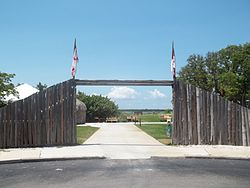De Soto National Memorial
De Soto National Memorial | |
U.S. National Register of Historic Places | |
U.S. National Memorial | |
 | |
 | |
| Location | Manatee County, Florida, United States |
|---|---|
| Nearest city | Bradenton |
| Coordinates | 27°31′26″N 82°38′40″W / 27.52389°N 82.64444°WCoordinates: 27°31′26″N 82°38′40″W / 27.52389°N 82.64444°W |
| Area | 26.84 acres (10.86 ha) |
| Built | 1539 |
| Visitation | 240,172 (2005) |
| Website | De Soto National Memorial |
| NRHP reference No. | 66000078 |
| Significant dates | |
| Added to NRHP | October 15, 1966[1] |
| Designated NMEM | March 11, 1948 |
De Soto National Memorial, in Manatee County 5 miles (8.0 km) west of Bradenton, Florida, commemorates the 1539 landing of Hernando de Soto and the first extensive organized exploration by Europeans of what is now the southern United States.
The memorial includes 26 acres (11 ha), where the Manatee River joins Tampa Bay. It has 3,000 feet (910 m) of coastline; eighty percent of the area is mangrove swamp[2]
De Soto expedition[]

In May 1539, Hernando de Soto and an army of over 600 soldiers landed in the Tampa Bay area. They arrived in nine ships laden with supplies: two hundred and twenty horses, a herd of pigs, war dogs, cannon, matchlock muskets, armor, tools, and rations. They were executing the order of King Charles V to sail to La Florida and "conquer, populate, and pacify" the land.
The expedition did not yield the gold and treasure these men sought. Instead, they marched from one village to the next, taking food and enslaving the native peoples to use as guides and porters. Hundreds of lives were lost on this calamitous four year, 4,000 miles (6,400 km) journey. The de Soto expedition would change the face of the American Southeast forever, and cause Spain to reevaluate her role in the New World. Ultimately, it was the first hand accounts of survivors, describing the native cultures and the richness of the land, which became the journey's enduring legacy.
Historic recognition[]

The national memorial was authorized on March 11, 1948. As with all historic areas administered by the National Park Service, the memorial was listed on the National Register of Historic Places on October 15, 1966, with the name Shaw's Point Archeological District.
The mission of De Soto National Memorial is to preserve the controversial story of this exploration and interpret its significance in American history. Visitors can attend living history demonstrations, try on a piece of armor, or walk the nature trail through a Florida coastal landscape similar to the one encountered by conquistadors almost five hundred years ago.[3]
Activities[]

Exhibits at the visitor center include historic armor, 16th-century weapons, and period artifacts. A theater displays the movie Hernando de Soto in America, about the DeSoto Expedition and the area's Native American population. A bookstore is also available.
During the cooler months, visitors can observe Camp Uzita, a living history camp which runs from December through April. The season ends with a re-enactment of DeSoto's landing on the beaches of Tampa Bay.
Other park activities include nature trails and guided trail walks, fishing, bird watching, and picnicking. Park admission is free.
See also[]
- List of National Memorials of the United States
- De Soto National Forest, in southern Mississippi
- Narváez expedition, the predecessor to De Soto's, having also begun near Tampa Bay on La Florida's west coast
- National Register of Historic Places listings in Manatee County, Florida
Notes[]
- ^ "National Register Information System". National Register of Historic Places. National Park Service. April 15, 2008.
- ^ "De Soto National Memorial: Nature". National Park Service. Retrieved 2016-06-24.
- ^ "De Soto National Memorial". National Park Service. with photos
References[]
- The National Parks: Index 2001–2003. Washington: U.S. Department of the Interior.
External links[]
- Official NPS website: De Soto National Memorial
- Hernando de Soto Historical Society
- DeSoto Seafood Fest <--Link not working, Nov. 2015
- Photo Gallery of De Soto National Memorial, <--Broken link, Nov. 2015.
| Wikimedia Commons has media related to De Soto National Memorial. |
- Archaeological sites in Florida
- National Register of Historic Places in Manatee County, Florida
- National Memorials of the United States
- Spanish colonization of the Americas
- Spanish Florida
- Museums in Manatee County, Florida
- History museums in Florida
- Biographical museums in Florida
- Native American museums in Florida
- Protected areas established in 1948
- National Park Service areas in Florida
- Monuments and memorials in Florida
- Parks in Manatee County, Florida
- Florida Native American Heritage Trail
- Monuments and memorials on the National Register of Historic Places in Florida

